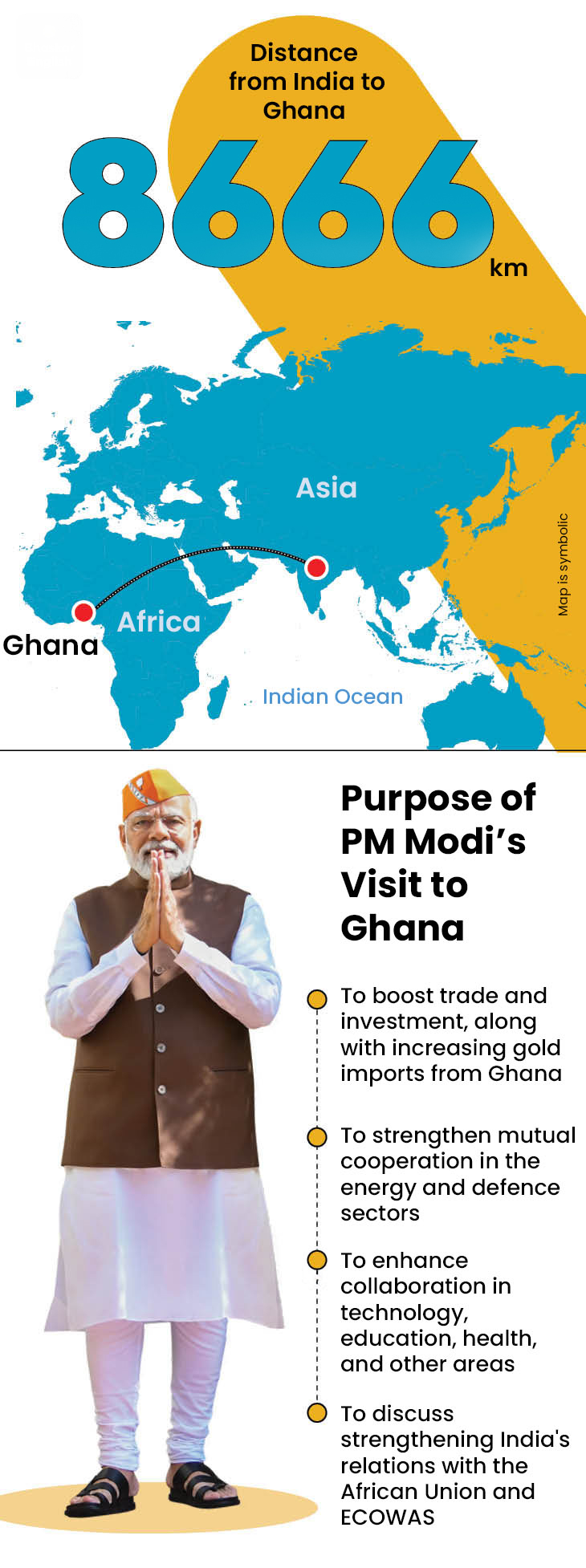Context
The recent visit of Indian Prime Minister Shri Narendra Modi to Ghana is being seen as a decisive turning point in India-Africa relations. This visit was part of his eight-day diplomatic tour of five countries and marks a significant transformation in India’s Africa policy. It is also notable as the first visit by an Indian Prime Minister to Ghana in 30 years. During the visit, Prime Minister Modi was conferred with Ghana’s highest civilian honour—The Officer of the Order of the Star of Ghana—by President John Mahama.
Key Achievements and Areas of Cooperation:
1. Expansion of Bilateral Trade
India and Ghana have set a target to double their bilateral trade from $3 billion to $6 billion over the next five years. This reflects the economic complementarity between the two nations. While Ghana is rich in natural resources like gold, cocoa, and petroleum, India is a major exporter of pharmaceuticals, textiles, machinery, and other industrial goods. The realization of this goal will depend on modernization of trade logistics and removal of barriers.
2. Defence Cooperation and Strategic Partnership
Ghana has shown interest in procuring Indian defence equipment and training services, indicating increasing trust between the two nations. Indian cooperation will help Ghana address security challenges such as piracy in the Gulf of Guinea and terrorism in the Sahel region. This reflects India's approach to defence cooperation—based on mutual respect for sovereignty—which distinguishes it from many Western defence partnerships.
3. Cooperation in Health and Agriculture
India has pledged support to help Ghana establish itself as a vaccine manufacturing hub, a move of particular significance in the post-COVID global public health context. As the “Pharmacy of the World,” India’s technical expertise can be immensely beneficial to Ghana. In agriculture, India’s sharing of technologies in irrigation, storage, and value addition can strengthen food security and rural employment in Ghana.
4. Important Bilateral Agreements (MoUs)
During the visit, four significant Memoranda of Understanding were signed:
· Cultural Exchange Programme
· Cooperation in Standardization and Certification
· Collaboration in Traditional Medicine Systems
· Establishment of a Joint Commission
These agreements institutionalize the India-Ghana partnership and ensure that cooperation is systematic, sustainable, and long-term.
5. Maritime Security and Counter-Terrorism Strategies
The Gulf of Guinea is now considered a global hotspot for maritime piracy. India's naval capabilities can enhance Ghana’s maritime security, benefiting both countries’ trade interests in West Africa. Additionally, India’s counter-terrorism strategies, surveillance systems, and intelligence-sharing capabilities can help Ghana address the growing threat of extremism in the Sahel region.

India’s New Approach to Africa Policy
This visit signals a strategic shift in India’s traditional Africa policy. India is no longer limiting its role to development assistance but is now actively investing in defence, technology, and infrastructure sectors. Unlike China’s debt-based model, India’s approach is based on mutual benefit and respect—focusing on partnership rather than dependency.
Key Challenges
While the visit sends a positive message for the future, the major challenge lies in effective implementation. The trade targets can only be realized through improvements in logistics infrastructure, banking systems, and administrative efficiency. Defence cooperation must continue to prioritize Ghana’s sovereignty. Although India’s support for Ghana’s BRICS membership is crucial, the consensus-based nature of the group means support from other members—especially China and Russia—is also essential.
Conclusion
Prime Minister Modi’s visit has elevated India-Ghana relations to the level of a “Comprehensive Partnership.” This is not just a diplomatic gesture but a reflection of India’s multidimensional, participatory, and strategic engagement with Africa. If the commitments made during this visit are implemented effectively, the India-Ghana relationship can emerge as a model for South-South cooperation—centered around mutual respect, inclusivity, and shared development. India is no longer merely a provider of development assistance; it is evolving as a strategic partner investing in defence, technology, and infrastructure.






